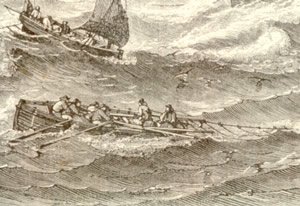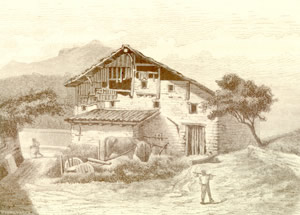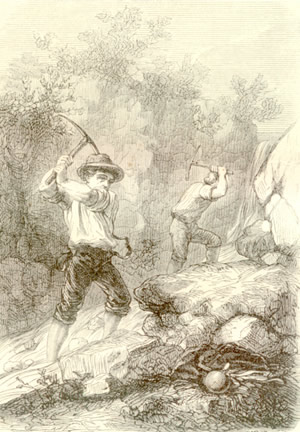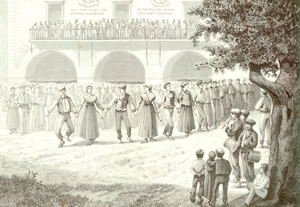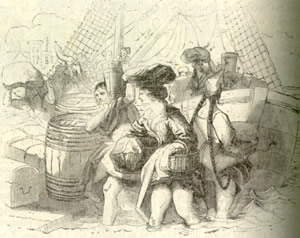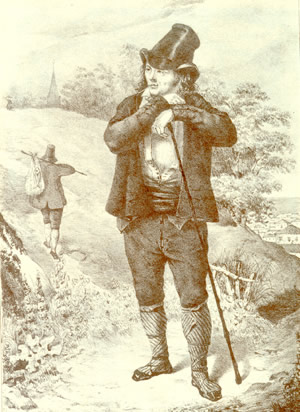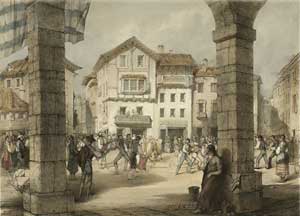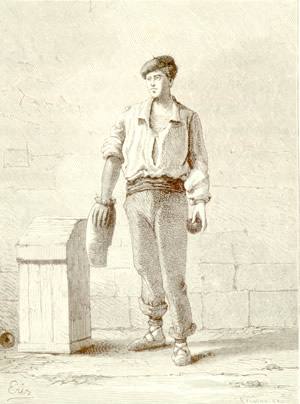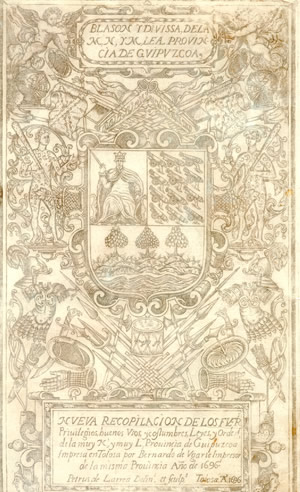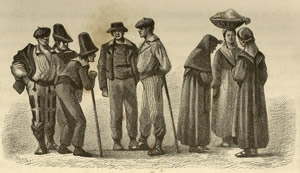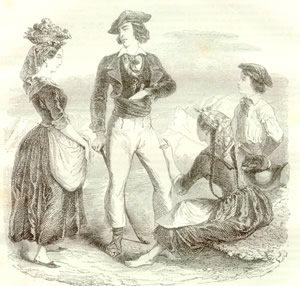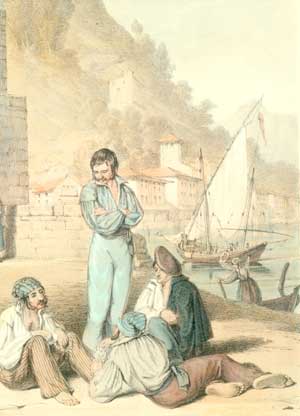12. FASCICLE
FISHING
"The men carry the nets to the boats. The large ones, called trainas, are very expensive to equip, and the skipper, to which they belong, therefore only lets the crew keep half the haul, keeping the rest for himself. Once all is in order on the boats, they row out doggedly yet with light spirits. (...) They rarely go further than 4 or 5 nautical miles into open waters, and each town can easily recognise its own. Whenever a storm threatens, smoke is sent up from the watchtower and upon seeing this signal, all the boats return at once either to their own port, or to another, whichever is closest."
11. FASCICLE
FARMHOUSES
"With only a few differences, all the houses are built in the same way. They generally have two floors and are built half from wood half from stones, with gently sloping roofs and no chimneys (...) In the arbour stood the carts and farm implements, and under an old oak tree there was a pile of leaves for manure. The kitchen served as the family meeting place, during the few hours in which they were not working in the fields. The small chambers close by were only used for sleeping, and for certain indoor occupations, such as weaving. Upstairs were the attics and right next to the kitchen, the stable."
10. FASCICLE
MINING
"Mining is not carried out anywhere with less art than here. Farmhands, who have no knowledge at all of the trade, have never set foot outside their mountains, and cannot even be called guilded miners, since they are not even distinguished by a particular suit of clothes, hack at the earth randomly, digging a hole, hitting the mineral at hand with a pick, and then, when they have worked for a certain time and the pit reaches a depth that is uncomfortable for them, or the water level rises too much, they simply abandon the site and dig a new hole, just as awkward and clumsy as the last."
9. FASCICLE
DANCES
"A series of dancers dance in a circle, holding hands and keeping time (...) But the most important part of the dance is always the bumping together of their rear ends, a movement called culadas.(...) It is impossible to doubt the happiness of all the dancers and spectators, both distinguished and humble, between which, especially in the dance and in pelota, all differences tend to disappear; they enjoy the activity from the bottom of their souls."
8. FASCICLE
WOMEN
"Respect for industriousness seems to have changed the roles of the sexes in the Basque lands, particularly in the French-Basque zone. Nowhere else have I seen so many laborious and difficult tasks carried out by women. In the Spanish region, they frequently work over the sour laya,(...) in Bilbao they carry the largest weights on their heads, particularly iron bars; even in the forges I have seen them working with the hammer and the anvil. But the most notable is that they combine this extraordinary strength with an equally extraordinary swiftness and agility."
7. FASCICLE
CLOTHING
"The genuine Biscayan has a completely particular suit. Instead of shoes, he wears abarcas, soles made from bull leather which only have a small curved edge and are tied with ropes. The colour of his trousers are generally black, and his waistcoat is red. Around the waistcoat he wears a faxa or sash. Instead of a cloak or jacket he wears a longarina, a large jacket with long tails and sleeves. The longarina is usually either dark brownish-grey or black. He covers his head with a black, pointy cap, rather like a helmet, with a triangular wing made from black velvet."
6. FASCICLE
SOKAMUTURRA
"The bull is made to run with a long rope, generally dragging loosely on the ground. Meanwhile, the drummer (a continuous companion in all popular diversions) plays his instrument and when the bull begins to tire, he is harassed by the dogs. Some mayors prohibit the game, however, since really, whenever it is played, the workshops stand empty, and I myself have seen between 50 and 100 men run after one of these bulls."
5. FASCICLE
PELOTA
"The game of pelota is the principal festival of the Basques. Not only does each town have its own frontón (pelota court), each one takes part in the game; like in everything else in the Basque country, but particularly in the game of pelota, no differences in social class are recognised, and on Sundays, a large part of the town, including both men and women, and not excepting the mayor and the priests, turns out to see the matches. Whole towns challenge each other to solemn matches and of all the Basque provinces, the Gipuzkoans seem to be the best players."
4. FASCICLE
FUEROS (System of established rights and privileges)
"It would be highly interesting to see developed the circumstances in favour of which this small mountain people managed, in times in which oppression and violence reigned all around, to establish an organisation which, being as far from despotism as from anarchy, is replete with a noble spirit of freedom, and whose beneficial consequences on the customs and character of those it affects are unmistakable even to this day."
3. FASCICLE
EUSKARA (The Basque language)
"The language is peculiar, in its words, its formation and its intonation, and is completely incomprehensible for foreigners, even in its most insignificant words.
Nowadays, decade by decade, it is being forced to retreat more and more into the mountains, attacked on all sides and treated as contemptible by the more learned sectors of the nation. And its decline will no doubt only become more pronounced from here on and in less than a century, perhaps the Basque language will have disappeared altogether from the list of living tongues."
2. FASCICLE
THE BASQUES
"In the midst of all this industriousness, the Basques are the most spirited and expansive people one could hope to meet, and even the most fatiguing day's work is often followed by music and dancing. No traveller can fail to notice the difference between their serenity and the indolent seriousness of the Castilian. They do not live in the need and difficulty of this race, but rather with all the comfort of wellbeing. Where beggars are found here, they are rarely natives, but almost always foreigners."
1. FASCICLE
EUSKAL HERRIA (THE BASQUE COUNTRY)
"The Basque provinces are utterly peculiar in nature and, located on the Spanish-French border, do not present, especially in their inhabitants, either the French or the Spanish character. They are a people of farmers, sailors and merchants, and do not lack for bodily wellbeing, without which moral prosperity is impossible. They have a free organisation, with public deliberations usually being held in the language of the country, thereby showing a common interest."
